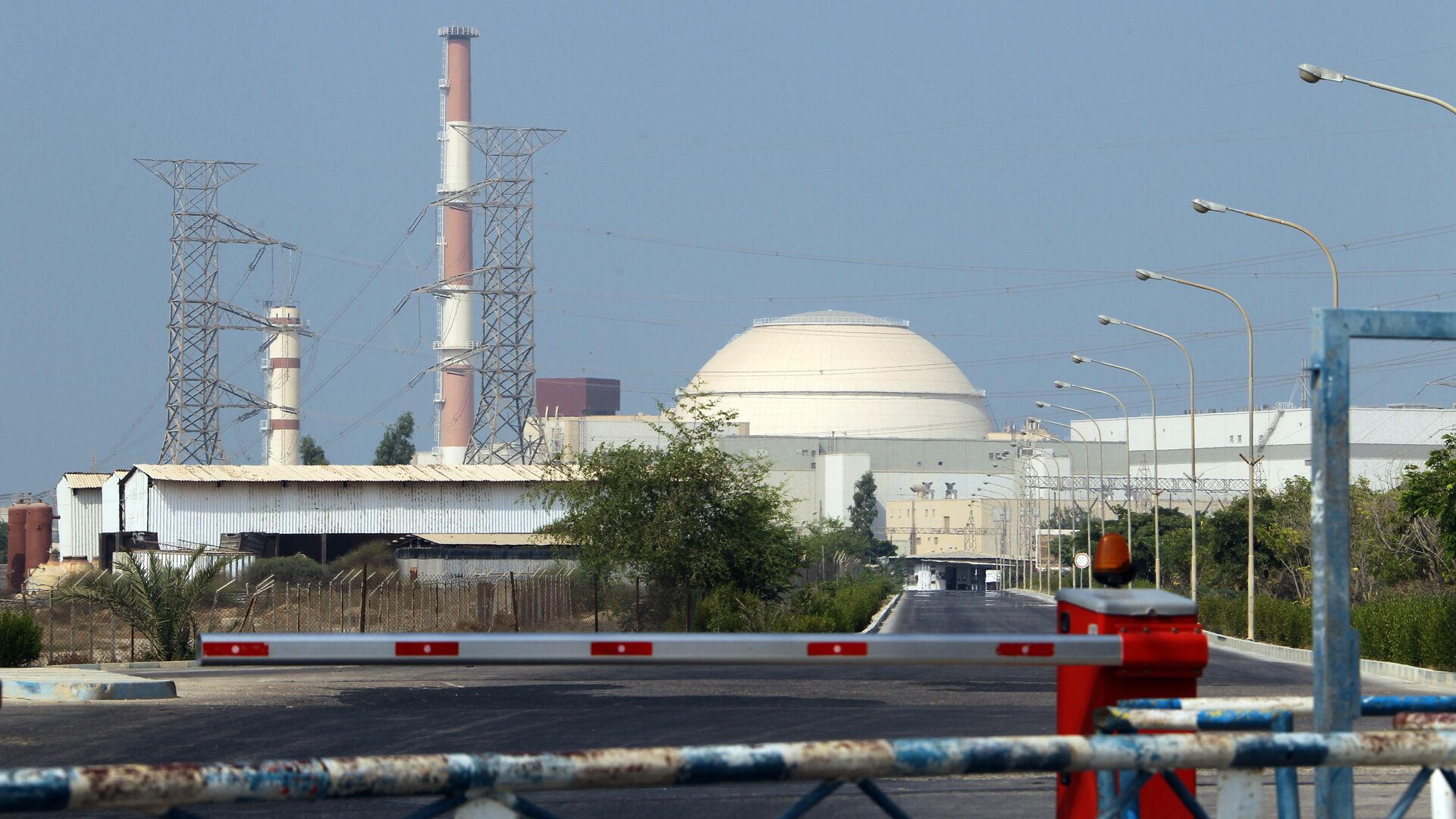https://sputnikglobe.com/20211225/iran-can-produce-nuclear-fuel-hopes-to-start-using-it-at-npp-soon-nuclear-agency-chief-says-1091788159.html
Iran Can Produce Nuclear Fuel, Hopes to Start Using It at NPP Soon, Nuclear Agency Chief Says
Iran Can Produce Nuclear Fuel, Hopes to Start Using It at NPP Soon, Nuclear Agency Chief Says
Sputnik International
Iran can produce nuclear fuel domestically and will soon start using it at the Bushehr nuclear power plant, Mohammad Eslami
2021-12-25T06:17+0000
2021-12-25T06:17+0000
2021-12-25T07:51+0000
middle east
iran
iran’s bushehr nuclear plant
https://cdn1.img.sputnikglobe.com/img/104473/71/1044737106_0:136:4648:2751_1920x0_80_0_0_616b440fb5b6be0fb0a6def4e1c23b8e.jpg
"Iran can already produce nuclear fuel domestically. We had talks with Rosatom and we hope that as part of our cooperation, based on the plans and contracts we will sign with it, we will be able to do this and start using Iranian fuel in the reactor in Bushehr", Eslami said.Iran is expecting Russia's state-owned nuclear company Rosatom to speed up the construction of the second and third power units at the Bushehr nuclear power plant, which is almost two years behind schedule, Mohammad Eslami added.In addition, Moscow supplies Tehran with the nuclear fuel needed for the operation of the reactor of the first unit. The last supply of the Russian fuel was made in April 2020.Tehran has paid Russia in full for the construction of the first block of the Bushehr power plant and has no outstanding debts to Moscow, Mohammad Eslami said.In August, Russian Ambassador to Iran Levan Dzhagaryan said that Moscow and Tehran had not settled the issue of Iranian debt for the Bushehr nuclear power plant due to US sanctions which froze Tehran's funds in Japanese and South Korean banks. Despite this, the NPP continued to operate normally.The construction of power units at the Bushehr NPP is the largest joint Russian-Iranian project. The first block of the nuclear power plant, completed in cooperation with Russia, was connected to Iran's national power grid in September 2011. The construction of the second block is underway, while a contract for the construction of a third power unit has been signed.The critical infrastructure of Iran's nuclear facilities is secure, and vulnerabilities are being constantly monitored for potential cyberattacks, Mohammad Eslami added.Iran's state electronic systems have recently become a target for cyberattacks. In October, Iranian gas station networks came under attack, allowing Iranian drivers to buy gas at lower prices. The authorities later said that the United States and Israel were behind the cyberattack.
iran
Sputnik International
feedback@sputniknews.com
+74956456601
MIA „Rossiya Segodnya“
2021
Sputnik International
feedback@sputniknews.com
+74956456601
MIA „Rossiya Segodnya“
News
en_EN
Sputnik International
feedback@sputniknews.com
+74956456601
MIA „Rossiya Segodnya“
Sputnik International
feedback@sputniknews.com
+74956456601
MIA „Rossiya Segodnya“
bushehr nuclear power plant, nuclear fuel, iran
bushehr nuclear power plant, nuclear fuel, iran
Iran Can Produce Nuclear Fuel, Hopes to Start Using It at NPP Soon, Nuclear Agency Chief Says
06:17 GMT 25.12.2021 (Updated: 07:51 GMT 25.12.2021) MOSCOW (Sputnik) - Iran can produce nuclear fuel domestically and will soon start using it at the Bushehr nuclear power plant, Mohammad Eslami, the head of the country's Atomic Energy Organisation (AEOI), told Sputnik.
"Iran can already produce nuclear fuel domestically. We had talks with Rosatom and we hope that as part of our cooperation, based on the plans and contracts we will sign with it, we will be able to do this and start using Iranian fuel in the reactor in Bushehr", Eslami said.
Iran is expecting Russia's state-owned nuclear company Rosatom to speed up the construction of the second and third power units at the Bushehr nuclear power plant, which is almost two years behind schedule, Mohammad Eslami added.
"The construction of the second and third power units is roughly 23 months behind schedule ... We expect Rosatom to make it possible to speed up the project's implementation with an agreed [upon] plan to compensate for all of the delays", Eslami said.
In addition, Moscow supplies Tehran with the nuclear fuel needed for the operation of the reactor of the first unit. The last supply of the Russian fuel was made in April 2020.
Tehran has paid Russia in full for the construction of the first block of the Bushehr power plant and has no outstanding debts to Moscow, Mohammad Eslami said.
"No. Not anymore. Iran paid off all its debts to the Russian Federation", Eslami said in response to a question about financial issues between the two countries concerning the NPP project.
In August, Russian Ambassador to Iran Levan Dzhagaryan said that Moscow and Tehran had not settled the issue of Iranian debt for the Bushehr nuclear power plant due to US sanctions which froze Tehran's funds in Japanese and South Korean banks. Despite this, the NPP continued to operate normally.
The construction of power units at the
Bushehr NPP is the largest joint Russian-Iranian project. The first block of the nuclear power plant, completed in cooperation with Russia, was connected to Iran's national power grid in September 2011. The construction of the second block is underway, while a contract for the construction of a third power unit has been signed.
The critical infrastructure of Iran's nuclear facilities is secure, and vulnerabilities are being constantly monitored for potential cyberattacks, Mohammad Eslami added.
"Every country pays great attention to ensuring the safety of its nuclear power plants... All our systems are secure, all their vulnerabilities are under control thanks to the measures we have taken. We hope that such heightened security measures in our nuclear infrastructure will disappoint those trying to compromise it", Eslami said.
Iran's state electronic systems have recently become a target for cyberattacks. In October, Iranian gas station networks came under attack, allowing Iranian drivers to buy gas at lower prices. The authorities later said that the United States and Israel were behind the cyberattack.

